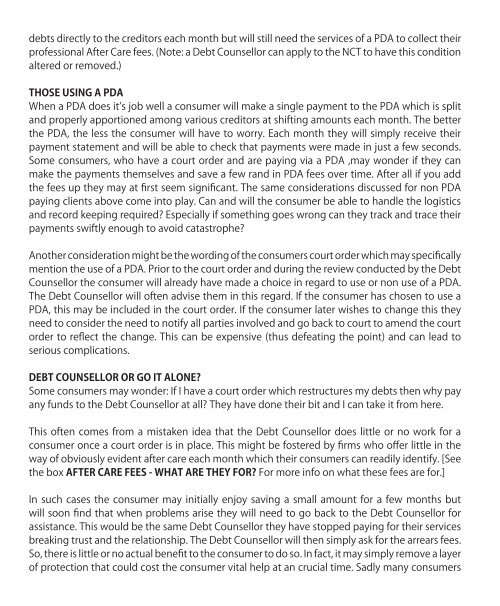Debtfree DIGI Magazine Aug 2016
The August issue of Debtfree magazine. SA's free monthly debt counselling and debt review industry magazine. We look at the great call centre debt review debate, the latest industry news and events like the DCASA Conference. We have interviews and more.
The August issue of Debtfree magazine. SA's free monthly debt counselling and debt review industry magazine. We look at the great call centre debt review debate, the latest industry news and events like the DCASA Conference. We have interviews and more.
You also want an ePaper? Increase the reach of your titles
YUMPU automatically turns print PDFs into web optimized ePapers that Google loves.
debts directly to the creditors each month but will still need the services of a PDA to collect their<br />
professional After Care fees. (Note: a Debt Counsellor can apply to the NCT to have this condition<br />
altered or removed.)<br />
THOSE USING A PDA<br />
When a PDA does it’s job well a consumer will make a single payment to the PDA which is split<br />
and properly apportioned among various creditors at shifting amounts each month. The better<br />
the PDA, the less the consumer will have to worry. Each month they will simply receive their<br />
payment statement and will be able to check that payments were made in just a few seconds.<br />
Some consumers, who have a court order and are paying via a PDA ,may wonder if they can<br />
make the payments themselves and save a few rand in PDA fees over time. After all if you add<br />
the fees up they may at first seem significant. The same considerations discussed for non PDA<br />
paying clients above come into play. Can and will the consumer be able to handle the logistics<br />
and record keeping required? Especially if something goes wrong can they track and trace their<br />
payments swiftly enough to avoid catastrophe?<br />
Another consideration might be the wording of the consumers court order which may specifically<br />
mention the use of a PDA. Prior to the court order and during the review conducted by the Debt<br />
Counsellor the consumer will already have made a choice in regard to use or non use of a PDA.<br />
The Debt Counsellor will often advise them in this regard. If the consumer has chosen to use a<br />
PDA, this may be included in the court order. If the consumer later wishes to change this they<br />
need to consider the need to notify all parties involved and go back to court to amend the court<br />
order to reflect the change. This can be expensive (thus defeating the point) and can lead to<br />
serious complications.<br />
DEBT COUNSELLOR OR GO IT ALONE?<br />
Some consumers may wonder: If I have a court order which restructures my debts then why pay<br />
any funds to the Debt Counsellor at all? They have done their bit and I can take it from here.<br />
This often comes from a mistaken idea that the Debt Counsellor does little or no work for a<br />
consumer once a court order is in place. This might be fostered by firms who offer little in the<br />
way of obviously evident after care each month which their consumers can readily identify. [See<br />
the box AFTER CARE FEES - WHAT ARE THEY FOR? For more info on what these fees are for.]<br />
In such cases the consumer may initially enjoy saving a small amount for a few months but<br />
will soon find that when problems arise they will need to go back to the Debt Counsellor for<br />
assistance. This would be the same Debt Counsellor they have stopped paying for their services<br />
breaking trust and the relationship. The Debt Counsellor will then simply ask for the arrears fees.<br />
So, there is little or no actual benefit to the consumer to do so. In fact, it may simply remove a layer<br />
of protection that could cost the consumer vital help at an crucial time. Sadly many consumers


















